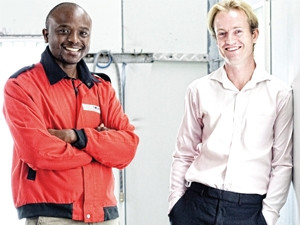
South African consumers have the power to radically change the country's economic landscape and build a better society for all its citizens. All they need to do is shop, but shop with intent.
Newly-formed Project Excellence is rallying consumers to spend more of their shopping budget among black entrepreneurs. It aims to increase consumer awareness of black-owned companies in Gauteng while also providing customer feedback to the owners of these businesses to help them up their service.
The success of black entrepreneurs is vital for the growth of South Africa's economy and the future prosperity and stability of the country, argues Project Excellence co-founder Julian Hewitt. "The black middle class spends an estimated R420 billion a year, R40 billion more than its white counterpart, but virtually all of that money is spent with white-owned businesses. We've created a consumer society that continues to enrich established entrepreneurs and shareholders," says Hewitt. "It's in the interests of all South Africans to support emerging black entrepreneurs to help grow the middle class, broaden the tax burden and create jobs."
Hewitt quit his job as head of Alan Gray's Orbis Foundation last year to pursue new ways of furthering education and entrepreneurship in South Africa. He was soon the subject of much local and international media scrutiny when he and his young family moved into Mamelodi for a month to live in community with township residents.
Hewitt, together with his partners in the enterprise Ntuthuko Shezi and Sizwe Nxumalo, has identified nearly 600 black-owned businesses in Gauteng. They include retailers and restaurants as well as plumbers, builders, lawyers and accountants. These businesses will be promoted on the soon-to-be-launched Project Excellence website. "We're negotiating with a major bank to produce a charge card that will incentivise consumers to use these companies. Shoppers will receive an SMS soon after they've completed their transaction, asking them to rate the service they received. This information will be relayed to the owner of the business," says Hewitt.
He expects an SMS service provider for Project Excellence to be appointed within a few months and the alliance with the bank to be concluded before the end of the year.
Improve service
Project Excellence was born out of the 'Buy Black' challenge the three founders launched in 2013. "We encouraged groups of South Africans to pledge to support black businesses for one month," says Shezi. The challenge revealed not only how little disposable income was being spent with black entrepreneurs, but also how difficult it was for consumers to locate such businesses and the long distances they needed to travel to support them. "It also showed us that people would not support a black business if the service it provided was inferior to other companies. Project Excellence was created not just to promote black entrepreneurs, but to help them raise the quality of their service," adds Shezi. Owners of businesses on the Project Excellence database will receive regular reports showing the service levels of their operations, comparisons with similar businesses, and spending patterns of charge card holders.
A more equitable society
"Once the concept has proved itself, we will look to generate revenue from these reports. Some business owners will be able to afford to pay for them themselves while others may be funded by various development agencies," says Nxumalo. Revenue will be used to cover the costs of Project Excellence as well as support emerging entrepreneurs. The project will also be extended from Gauteng to other provinces, says Nxumalo.
Some business owners will be able to afford to pay for them themselves while others may be funded by various development agencies.
Sizwe Nxumalo, Project Excellence
The Project Excellence database lists firms that are wholly-owned by black South Africans. "Companies that have outside shareholders usually have access to capital and expertise. We have focused on black African entrepreneurs because they come from the demographic group that is by far the largest in our society and was the most disadvantaged in the past," says Hewitt.
Barriers to success
One of the biggest obstacles facing black entrepreneurs is the stigma of poor service, says Project Excellence co-founder Ntuthuko Shezi. "Many consumers, both black and white, are reluctant to use the services of black entrepreneurs because they're concerned about the quality of the service they will receive. By encouraging entrepreneurs to raise service levels, Project Excellence is helping them become more competitive and successful," he says.
Shezi, founder of the Scratch Mobile panel-beating company that operates at OR Thambo International Airport, adds that there is an urgent need for successful role models to inspire more black entrepreneurs. "Most successful white entrepreneurs were exposed to business at an early age, and worked with their fathers or other relatives in the family business, whereas black entrepreneurs were denied such opportunities. Bright black graduates also tend to favour corporate careers rather than becoming entrepreneurs because of the stability these jobs offer. Many of them have to support an extended family," says Shezi.
He believes Project Excellence will not only help create a more equitable society but also enable all South Africans to participate in the economic transformation of the country.
"Consumers are already making value-based decisions when they buy fair trade coffee, organic tomatoes and low-sulphur diesel and when they choose which retailers to support. They can now support emerging entrepreneurs and contribute to broadening the creation of wealth in South Africa," he says.
*The UCT Unilever Institute of Strategic Marketing estimated that South Africa's black middle class comprised around 4.2 million people and spent R420 billion in 2012. It reckoned that South Africa's three million white middle-class South Africans spent around R380 billion in 2012.
First published in the June 2014 issue of ITWeb Brainstorm magazine.
Share